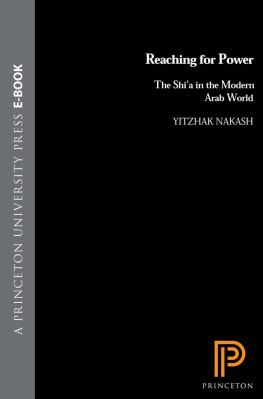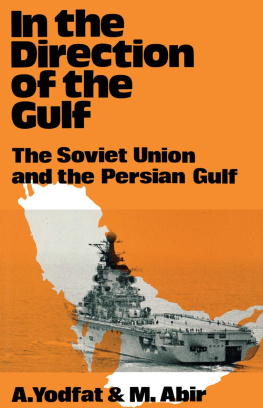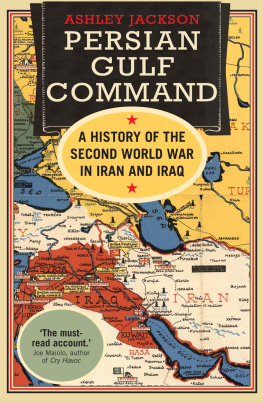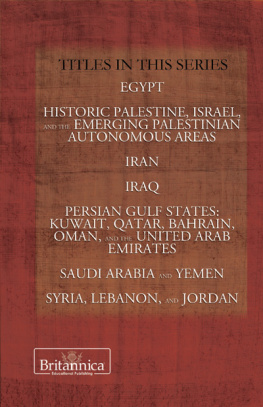Nakash - Reaching for power: the Shiʻa in the modern Arab world
Here you can read online Nakash - Reaching for power: the Shiʻa in the modern Arab world full text of the book (entire story) in english for free. Download pdf and epub, get meaning, cover and reviews about this ebook. City: Oxford;Princeton, year: 2006, publisher: Princeton University Press, genre: Politics. Description of the work, (preface) as well as reviews are available. Best literature library LitArk.com created for fans of good reading and offers a wide selection of genres:
Romance novel
Science fiction
Adventure
Detective
Science
History
Home and family
Prose
Art
Politics
Computer
Non-fiction
Religion
Business
Children
Humor
Choose a favorite category and find really read worthwhile books. Enjoy immersion in the world of imagination, feel the emotions of the characters or learn something new for yourself, make an fascinating discovery.
Reaching for power: the Shiʻa in the modern Arab world: summary, description and annotation
We offer to read an annotation, description, summary or preface (depends on what the author of the book "Reaching for power: the Shiʻa in the modern Arab world" wrote himself). If you haven't found the necessary information about the book — write in the comments, we will try to find it.
Nakash: author's other books
Who wrote Reaching for power: the Shiʻa in the modern Arab world? Find out the surname, the name of the author of the book and a list of all author's works by series.
Reaching for power: the Shiʻa in the modern Arab world — read online for free the complete book (whole text) full work
Below is the text of the book, divided by pages. System saving the place of the last page read, allows you to conveniently read the book "Reaching for power: the Shiʻa in the modern Arab world" online for free, without having to search again every time where you left off. Put a bookmark, and you can go to the page where you finished reading at any time.
Font size:
Interval:
Bookmark:


Yitzhak Nakash

The Shia in the Modern Arab World
PRINCETON UNIVERSITY PRESS
PRINCETON AND OXFORD
Copyright 2006 by Princeton University Press
Published by Princeton University Press, 41 William Street,
Princeton, New Jersey 08540
In the United Kingdom: Princeton University Press, 3 Market Place,
Woodstock, Oxfordshire OX20 1SY
All Rights Reserved
Library of Congress Cataloging-in-Publication Data
Nakash, Yitzhak. Reaching for power : the shia in the modern Arab world / Yitzhak Nakash.
p.cm.
Includes bibliographical references and index.
ISBN-13: 978-0-691-12529-9 (hardcover : alk. paper)
ISBN-10: 0-691-12529-5 (hardcover : alk. paper)
1. ShiitesMiddle East. 2. Islam and politicsMiddle East. I. Title.
DS59.S55N35 2006
320.956'088'29782dc22 2005021393
British Library Cataloging-in-Publication Data is available
This book has been composed in Sabon with Friz Quadrata display
Printed on acid-free paper. o
pup.princeton.edu
Printed in the United States of America
1 3 5 7 9 10 8 6 4 2
To Beth
And to Neta and Talya

Preface

A month before the January 2005 elections in Iraq, and a few days after gunmen brazenly shot to death election officials in broad daylight at the heart of Baghdad, the Ansar al-Sunna militant group issued a statement denouncing democracy as un-Islamic because it idolized human beings. Democracy, the statement read, is a Greek word indicating the rule of the people, which means that the people do as they see fit. This concept of government is apostasy because it defies the Muslim doctrinal belief that sovereignty rests with God. The statement was endorsed by two other Sunni insurgent groups. It warned that anyone who participates in the elections will not be safe, and was clearly aimed at countering the rulings of Shii clerics that voting in the elections was the duty of every Iraqi.
Both this statement, and the mounting violence in Iraq in the period before and after the elections, underscore the fierce struggle that is raging today among Muslims for the soul of Islama struggle that is taking shape at a time when America is attempting to play an assertive role in the Middle East, and as the geopolitics of the region are shifting. The outcome of this war of ideas within Islam will have a profound impact not only on the people of the Middle East, but also on the relations between Muslim and Western societies.
This book illuminates some of the historical dimensions of this struggle. It focuses on the Shiis, who constitute the minority sect within Islam, and who stand today at the center of a U.S. government attempt to remake the Middle East. The history discussed here shows how Shiis in the Arab world have responded to the upheaval resulting from the collapse of the Ottoman Empire and the rise of the nation-state in the twentieth century. It introduces us to Shii political communities whose members had to take on a new identity and redefine their relations with newly emerging states, and to non-Shii ruling elites backed by Western powers who were unwilling to accommodate the Shiis within the modern state. The repercussions of this upheaval, and of the shortcomings of the nation-state, are in full play today in the Middle East.
The analysis presented here demonstrates the sociopolitical transformation experienced by Arab Shiis in the period preceding the rise of the nation-state in the Middle East and continuing through it to the January 2005 elections in Iraq. The book captures the surge of Shiism as a political force since the Iranian Islamic Revolution of 197879. It draws attention to the pivotal change in Shii attitudes toward the West, most notably the shift of focus among Shiis since the 1990s from confrontation to accommoda-tiona development that stands in stark contrast to the growing militancy among Sunni groups, and which carries implications for the U.S. endeavor in the Middle East. At the same time, the book seeks to alert readers and policymakers to the strong nationalist sentiments of Shiis in the Arab world, underscoring the tough challenge that the United States faces in attempting to impose a new order in the region.
The book takes up the cases of Shiis in Saudi Arabia, Bahrain, Iraq, and Lebanon. It highlights the reciprocal influences shaping the political development of Shiis in these states, and assesses the impact that the revival of Shiism has had on the larger Arab world. The narrative begins with a prologue on the 2003 U.S. invasion of Iraq and the vision of government offered by Shiis under the leadership of Grand Ayatollah Ali Sistani for the post-Bath period. The prologue incorporates background information on Shii Islam and on the states discussed in the book, and is intended to introduce the nonspecialist reader to the topic. The purpose of chapter 1 is to illustrate the vicissitudes that Shiis experienced before the twentieth century and which affected their position in the modern state. Chapters 2, 3, and 4 illuminate the distinct political experience of Shiis in Saudi Arabia, Bahrain, Lebanon, and Iraq before the U.S. invasion and the tensions underlying Shii-govern-ment relations in each country. The attempts of Shiis to carve out a political space for themselves in the wake of the Gulf War of 1991 and the recent war in Iraq are the focus of chapter 5. A concluding chapter highlights the risks and possibilities arising from the assertion of Shii power in Iraq and from the declared intention of the United States to bring democracy to the Middle East.
In the ten years of researching and drafting this book, I met scores of Shii writers and activists of different countries and political persuasions; many of them were forced to live and publish their works in exile. The writing of the exiles has often built on and extended the work of Shiis inside the Arab world, resulting in a rich literature that has shaped the contemporary aspirations of Saudi, Bahraini, Iraqi, and Lebanese Shiis. This literature stands as testimony to the aspiration of people in the Middle East to adapt Islam to modern times and be the masters of their future and their political destiny.
A Note on Transliteration

In transcribing Arabic and Persian into English, I have kept the general reader in mind. The system used here is a simplified form of the one adopted by the International Journal of Middle East Studies. I have kept the diacritic () for the Arabic consonant ayn in words such as Ali and Shiis, as well as () for hamza, the character designating the glottal stop, as in tarikh. The plural of Arabic words has been marked by an addition of an s to the singular, except in such cases as ulama, where the plural form has become standard. The article al- has been omitted from last names indicating a persons non-Arab place of origin, such as Sistani, Khoei, Khomeini, or Shirazi, and from Arabic names that have been widely cited in the Western media without the al-, such as Iyad Allawi. Readers should also note the difference between the article al- and the word Al, which means the house of, and is used in this book in reference to Arab tribes and, in the cases of the Al Saud and the Al Khalifa, the ruling families of Saudi Arabia and Bahrain respectively.
Font size:
Interval:
Bookmark:
Similar books «Reaching for power: the Shiʻa in the modern Arab world»
Look at similar books to Reaching for power: the Shiʻa in the modern Arab world. We have selected literature similar in name and meaning in the hope of providing readers with more options to find new, interesting, not yet read works.
Discussion, reviews of the book Reaching for power: the Shiʻa in the modern Arab world and just readers' own opinions. Leave your comments, write what you think about the work, its meaning or the main characters. Specify what exactly you liked and what you didn't like, and why you think so.











